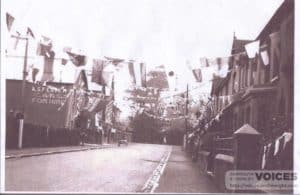WWII: a boy’s perspective
From 1941 we were living at Lee Farm, Dad was bailiff for Granny Haigh. Later we moved to Thorley Lodge, then Michaelmas Cottage ( now South Lee) and eventually North View.
I can remember seeing the overturned earth from bombs which dropped adjacent to the railway line just east of the Lee Brickyard. I imagine they were trying to hit the railway line. How many bombs it was I don’t know, but I can remember seeing two craters.
I was outside with father one night, because when he was not on Home Guard duty, he used to love being outside watching it all go on, and you could see the search lights and the anti aircraft shells bursting. All of a sudden there was this terrific screech, which you did get occasionally when you had stuff coming down. And there was this bang and the next morning father found this large piece of shrapnel which had gone through the roof of the meal house. It was about twenty yards away from where we were standing.
There was a gun emplacement at the top of Broad Lane, a bit before you get to Dog Kennel, on the side of the road there where there’s a footpath goes across. It was only about twelve foot square. Where the Home Guard used to go night time I don’t know, Brook, I think. Father did have a rifle quite quickly after the Home Guard was formed, although they didn’t have enough to go round. Yes, he was handy with a shotgun. As well as having a couple of shotguns of his own, he did have a revolver and very nice large knife, a beautiful thing, illegal these days. Him and Bill Welstead were Home Guards.
I would have ten or nine, I remember being fairly close to the old estate carpenters shop and I could hear vehicles coming in through the gates. At that time, closest to Thorley Lodge was a granary and that big stone barn, and alongside that was a double tin barn. I was there playing, and these vehicles came in and scattered themselves around the area in the yard and adjacent fields. There were three or four fifteen hundredweight Bedford type things with lots of aerials sticking out, with canvas backs. One had a solid back, if I remember it was a Commer. There was at least one armoured scout car, couple of motorcycles and two or three large-ish type jeeps – and the men had an odd uniform with pill box type peak caps for officers. I didn’t know what they were saying or who they were. It was only when father took them down a basket of eggs we found out, not what they were about, but who they were – French. They were there probably for two days and then one morning they were gone. That was a few days before or after D Day June ’44.
We milked in the long stable and the cows would have just been chained up. It was quite a herd.
I think there was about eighteen in the bottom shed and six or seven in the top shed, twenty five milked by hand. One man could milk twelve, they reckon, so there must have been two men milking.
We had an Italian Prisoner of War, Giovanni Azara, he became head milker along with father. Father was always up at half past five every morning and they used to bring ‘Johnny’ over about seven o’clock.
He arrived probably ’42. He had farming experience, I think he was from the Po Valley agricultural area so he knew what he was doing and he loved being with the cows. He had a terrific pride in his work. He was lovely chap. I would think he was about twenty.
You weren’t supposed to allow them in the house or anything. I must admit mother flaunted the rules a bit towards the end particularly. We had to get permission to give him a crucifix when he left and I can remember him hugging mother and crying because he didn’t want to go home.
We didn’t have holidays. Gracious no. Went to Grandmother’s and Auntie’s for tea on Sunday. We weren’t short of food. Father could go and shoot a few rabbits, there were plenty about.
I remember there were two old ladies, spinster ladies, the Misses Vaudrey. They lived over at Cranmore somewhere. And they used to come two or three times a week with mashed fish and stuff to feed the farm cats.
There were some celebrations I remember, I’m sure it was VE day. My grandmother and two of my uncles lived at Marks Corner, and I can remember going up there and there was a great big long table laid out with lots of goodies. Some of the soldiers in Parkhurst Forest were Canadians but I think these were Americans; they seemed to provide all the goodies. We had a big party to celebrate. But I don’t remember any parties going on in the Yarmouth area. I think it was just a sigh of relief. Ron Wallis b 1935




